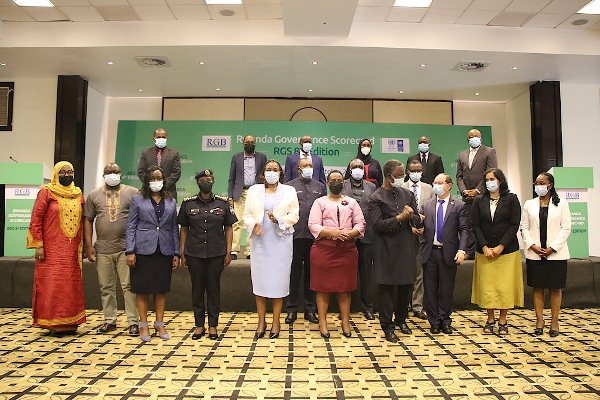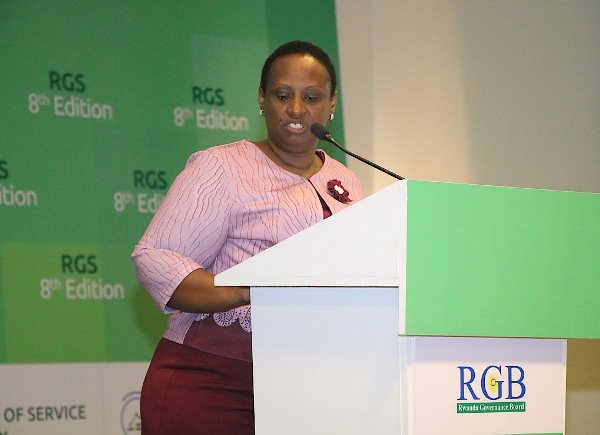
Group photo of participants at the launch of RGS 8th Edition
On Friday 8th October 2021, Rwanda Governance Board published the Rwanda Governance Scorecard 8th Edition. The event took place at Serena Hotel and attracted a variety of participants including Heads of Government institutions, members of the diplomatic Corps accredited to Rwanda, Heads of International organisations, Representatives of Civil Society Organisations, the private sector, the academia and media.
The Rwanda Governance Scorecard is a national index published every year to consistently assess the state of governance in Rwanda. It is built on eight pillars namely; Rule of Law, Political Rights and Civil Liberties, Participation and Inclusiveness, Safety and Security, Investing in Human and Social Development, Quality of Service Delivery, Economic and Corporate Governance, as well as Anti-Corruption, Transparency and Accountability.
For the first time, the Pillar of quality of service delivery recorded its highest score to enter in the green range since the inception of this index with a score of 81.86%. This pillar emerged registered the highest improvement of 3.55% from the previous RGS Edition. According to the research findings, the improvement in this pillar is mainly attributed to the Indicator of Service delivery through ICT which increased by 5.07%.
With regards to the performance of other pillars, Safety and Security maintained the lead with score of 95.47%, followed by Rule of Law with 87.08%, Anti-Corruption, Transparency and Accountability with 86.77%, Participation and Inclusiveness with 84.19%, Political Rights and Civil Liberties 83.80%, Quality of Service Delivery with 81.86%, Investing in Human and Social Capital with 75.23% while the least performing pillar was Economic and Corporate Governance with a score of 74.65%, declining by 3.49% due to the negative impact of Covid-19 that led to an economic drop of -3.4% in 2020.
In the RGS 8th Edition, 5 out of 8 pillars recorded an improvement. Those are Participation and Inclusiveness, Safety and Security; Investing in Human and Social Capital; Anti-Corruption, Transparency and Accountability and Quality of Service Delivery.

Dr. KAITESI Usta presenting the findings of RGS 8th Edition
While presenting the findings of RGS 8th Edition, Dr KAITESI Usta, the Chief Executive Officer of RGB stressed that the improvement in the above pillar reflects the role of good governance as key enabler of Rwanda’s effective response to the Covid-19 pandemic.
“The improvement in the above pillars as revealed by this research, is not about figures. It rather indicate the reality on the ground, as an undeniable fact of the efforts invested by the Government of Rwanda in covid19 response, the role of citizens in response and the particular efforts invested in protecting the citizens and assisting the vulnerable during this critical period” Said Dr. KAITESI Usta.
Dr Fode Ndiaye, the UN Resident Representative in Rwanda who participated in the event, commended RGB for keeping the regularity of publishing the Rwanda Governance Scorecard in spite of the challenges imposed by Covid-19. He also emphasized that RGS is an important tool for fostering accountable governance and fast tracking development.
“The impact of RGS as a national assessment tool transcends the national level to play an important role in the context of renewed multilateralism and the UN decade of action to speed up the implementation of the shared commitment for sustainable development” Said Fode Ndiaye
The RGS is a crucial tool that tracks the Country’s performance in relation to her national, regional and global governance commitments. This index places global governance standards and home-grown approaches at the centre of its method which makes it uniquely relevant to both the international and national contexts.
The objectives of RGS are to generate credible and reliable data on governance, and serve as an evidence-based source to inform policy, decision making and implementation as well as contribute to current scientific and contextualised knowledge about economic, social and political governance in Rwanda. (End)
